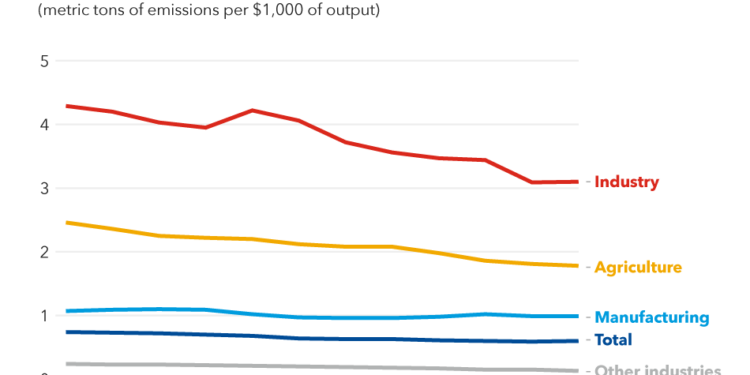Integrating economic and climate data will strengthen climate policy
As economies worldwide strive to reduce emissions and achieve sustainable growth, reliable data is crucial. It forms the foundation for informed decision-making, guiding policy development, implementation, and monitoring.
Recognizing this, the Group of Twenty is stepping up efforts to enhance the scope and quality of climate-related data. Through the third phase of the Data Gaps Initiative, it seeks to better integrate climate data with macroeconomic statistics. Doing so allows us to better understand the environmental impact of economic activities and the effectiveness of climate policies.
The Chart of the Week highlights one such useful metric: greenhouse gas emission intensities, which measures emission levels relative to industry output. This shows which industries are producing more pollutants per dollar of output and can guide efforts to reduce emissions in the most impactful areas.
 |
The chart reveals some promising trends. Specifically, the data show notable reductions in emission intensities within agricultural and industrial sectors, the latter encompassing electricity, mining, and water industries. This is particularly encouraging as these sectors together account for over 75 percent of all G20 emissions and are among the most emission intensive. This decline in emission intensities suggests that lower carbon sources of energy, cleaner technologies, and energy efficiency improvements are bearing fruit. To better understand how these dynamics are playing out across industries and economies more granular data is required. Supplying more granular data to better understand the transition towards a lower carbon economy is an important objective of the G20 Data Gaps Initiative.
While emission intensities in some key sectors are falling, the overall pace is still insufficient to decouple economic growth from emissions in time to meet climate goals. The 2023 Intergovernmental Panel on Climate Change’s report indicates that global greenhouse gas emissions would need to decline by at least 43 percent by 2030 compared to 2019 levels to keep global warming from exceeding 1.5 degrees Celsius. Achieving this reduction in emissions while maintaining economic growth would drive emission intensities towards zero—where we ultimately need them to rest.
A deeper dive into the data also reveals significant and persistent gaps. While more data are becoming available through the data initiative, most G20 economies still do not regularly produce these statistics or do so without the necessary sectoral detail. This lack of robust data coverage hampers effective management and decision-making, reinforcing the adage, “You can’t manage what you don’t measure.”
Greenhouse gas emissions from productive activities are only one part of a country’s carbon footprint. For a full understanding of global progress, particularly from the perspective of implementing border adjustments, it is necessary to account for emission reductions achieved by shifting pollution-intensive activities to economies outside of the G20. However, addressing this issue requires a global perspective. One goal of the initiative is to expand carbon footprints for the G20 that reflect each country’s emissions, irrespective of where the emissions physically occur.
The ongoing initiatives under the third phase to standardize and expand air emission accounts go beyond mere procedural adjustments; they play a critical role in better aligning economic policies with sustainable goals. As the work progresses, it will continue to improve the ways in which countries measure and ultimately manage their environmental impact.








